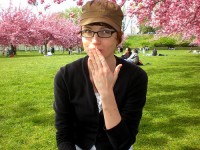Creative Writing 101


[ WORK DISCUSSED: Tuesday (9/22) – Adrienne Rich, five poems and an essay. Thursday (9/24) – “New York” by Tony Towle; “Texas” by Padgett Powell; “Babalu-Aye” by Eva Talmadge;” writing exercise.]
I never know how to start the class off. Or anyway that’s how it feels. I usually arrive in the room a few minutes early, and start chatting with whoever else is already there. If there’s a conversation already in progress I’ll try to join it, and if they’re all just sitting around quietly I’ll pick someone and ask how his or her day is going, or how the weekend was. If they throw the question back at me (“and how about you?”) I’ll tell them. I try to take attendance right at the official start time, not so much to punish the stragglers as to reward those who got there early. I want them to see me seeing the effort they’ve made. So we do that, and it’s like–now what? “Okay,” I often find myself saying, “what did we read for today?” It’s not that I can’t remember what we read. It’s just that I think there’s something useful about saying it out loud. I asked the class if they preferred to talk about the poems or the essay first. A few people kind of said “poems,” so I said okay, but then there was another choice to be made–which poem? One of the pitfalls of my teaching style (which strives to be dynamic, responsive, and rigorously un-structured) is that it’s hard to get off the ground. It’s like an old prop plane, where you need to start the propellers spinning by hand and then sort of guide it down the runway and hope everything is timed just right and take-off actually happens. Sometimes this takes a few tries. Nobody seemed to care where we started, and consequently we weren’t starting at all.
I attempted to project a bit more confidence than I was actually feeling, and waited to see who would say something. Soon enough, a student ventured that she liked the ending of “Origins of History of Consciousness.” As good a place to start as any, I thought. If I’m remembering correctly, she liked the last stanzas-
But I can’t call it life until we start to move
beyond this secret circle of fire
where our bodies are giant shadows flung on a wall
where the night becomes our inner darkness, and sleeps
like a dumb beast, head on her paws, in the corner.
Because I’m an evangelist for the value of the concrete detail, we began with the dumb beast of night, and talked about how the image gains power through the accumulation of establishing detail: the head on paws, the location (corner) in physical space. Then we worked together back up through the stanza, teasing out what some of us took to be an allusion to Plato’s cave. Since some people were unfamiliar with this, I asked the girl who’d first named it for us to explain it, and she did–probably with more concision and clarity than I could have managed. The notion of only being able to see the thrown shadows of really-existing but perpetually inaccessible things set a lightbulb off in another student’s head, and he proposed that the closing image of the shadows on the wall was a balancing or responding image to the opening stanzas-
Night-life. Letters, journals, bourbon
sloshed in the glass. Poems crucified on the wall,
disssected, their bird-wings severed
like trophies. No one lives in this room
without living through some kind of crisis.
No one lives in this room
without confronting the whiteness of the wall
behind the poems, planks of books,
photographs of dead heroines.
Without contemplating last and late
the true nature of poetry. The drive
to connect. The dream of a common language.
We theorized that “the wall behind the poems” was the empty page, the literal wall of the room from the first stanza become figurative (though, importantly, not abstract) in its transformation into the page. It seems to me that the page-as-wall seems to highlight the solipsism of the artistic process, a process that is paradoxically inspired by “the dream of a common language.” The ink thrown on the page is at best a proximal representation of the untranslatable feeling or emotion or urge that set the pen to the paper in the first place: a shadow of something infinitely elusive, and yet the presence of which is undeniable. The proof is in the shadow.
So what about that title? The movement of the poem takes us from the development of a self in section I (all the tics of the aspiring young writer: Great Works on the wall, rigorous self-interrogation, booze in the glass, etc.) to that self’s increasing need for engagement with the outside world. In section II the speaker meets a lover, but also, importantly, gains a sense of what it means to be part of a society. I wish there was enough time in my Expository Writing class’s syllabus to take a class period aside and talk about this poem in terms of their assignment to write about urban safety and citizenship (they’re reading Rebecca Solnit and Malcolm Gladwell)-
…these two selves who walked half a lifetime untouching–
to wake to something deceptively simple: a glass
sweated with dew, a ring of the telephone, a scream
of someone beaten up far down in the street
causing each of us to listen to her own inward scream
knowing the mind of the mugger and the mugged
as any woman must who stands to survive this city,
this century, this life…
And it is only with all of these things in mind that the closing of the poem can be understood in the fullness of its gravity and scope- this idea that community is a version of the kind of love and especially trust that is required (but also: terrifying, and very very hard) for two people to share if they are to share a life together–and how much more complex and delicate for being writ so large! Also that the perpetual elusiveness of the strived-for Real doesn’t excuse us from striving for it, or from making the most of what’s actually in front of us, even if those things are in the end just shadows.
Intermixed with this long discussion of “Origins” was some solid talk about “Phantasia for Elvira Shatayev” and “Dedications.” All these ideas about what it means to imagine “the other”- whether the chorus of phantom voices who narrate “Phantasia” or the many and several addressees of “Dedications” (“I know you are reading this poem by fluorescent light / in the boredom and fatigue of the young who are counted out” — hey, she nailed us!). Then I had some things I wanted to say about “Diving into the Wreck,” mostly about how far afield its structure is from “Origins” or “Phantasia.” I want to instill in my students this idea that form and content are unified–or rather, that form is a species of content–and that the choices you make about both inform one another. “Phantasia”‘s snowy stutter of fragments in long lines shot through with spaces as compared to “Origins”‘s tidy compartmentalization as compared to “Diving”‘s longish skinny stanzas that just come one after the other after the other, at the deliberate speed of a diver bound bottomward. That plus the line- “the wreck and not the story of the wreck” which I think has a valuable koan-like quality to it. It tells us something about what writing should do, and also about how it should do it. There are far worse mottoes for a young writer to have “crucified on the wall.”
The only poem we didn’t talk about was “Storm Warnings,” which was fine with me. It was my least favorite of the group, and only assigned because there’d been space leftover on the page when I was making the copies. I feel like that poem is too infatuated with its own portentousness, and I was glad nobody brought it up. We moved on to talk about “Legislators of the World.”
I had brought my copy of Shelley’s Major Works to school with me, and had hoped to read “The Defence of Poetry” before class started, but the day conspired against me, It would have been nice for us all to have read the several pages of text leading up to Shelley’s declaration that “poets are the unacknowledged legislators of the world,” having none of us do it was pretty good too. As Rich points out, in the “Defence” he was saying it for the second time, having already said it once (and included “philosophers” alongside poets) in “A Philosophical View of Reform” sometime earlier.
We spent a good bit of time unpacking what Shelley meant by this. We theorized that poetry, philosophy–and more generally, all the creative arts–have the ability to instill values, shape worldviews, etc. by playing a formative/generative role in the public imaginary. It is not the place of art to shape policy, or write laws, but it is the place of art to cultivate the spirit of those people who do. The arts are powered by what Rich calls “the great muscle of metaphor, drawing strength from resemblance in difference.” This capacity for drawing likeness from otherness is central to both the human ability to feel compassion and to the project of imaginative literature. If anyone ever asks you why the arts in general tend toward a progressive bias, explain it to them in these terms. Because progressivism (in all cultures at all times, not just in America today) is based on the value of compassion, and the perpetual identification of the self with the other, sameness not despite difference but actually through it. The conservative rejection of those values is essentially a rejection of the entire project of the humanities as such.
We talked about Rich’s claim in the essay that “There is no universal Poetry” in light of both Shelley’s remark about poets as legislators and in light of “the dream of a common language” from “Origins.” We decided that there was no contradiction between the various assertions, even though at first there seemed to be one. An urge toward (or from) the universal may yet be the inspiration for writing poetry, but the final product does not function on anything like a universal scale. It works its magic on individuals, is experienced in solitude even as it was written in solitude, and is in the end a transmission from one self to another self, though it requires the very world itself as the medium of transmission. Poetry doesn’t fail because it fails to achieve universality–or at least, no more than anything else that fails to achieve universality, which is pretty much, uh, everything. Poetry succeeds because it can succeed in achieving an individual connection. Very often, that connection is between a person and her/hisself. The tiniest scale imaginable, but also perhaps the most miraculous.
So that was Tuesday.


Thursday. So Tuesday was pretty heavy, huh? After that, I thought we deserved a change of pace. So I assigned the class two short-shorts and a poem. I also want to start moving the class away from philosophical discussions about the nature of literature/life, and toward a more craft-oriented approach. I’m supposed to be teaching them writing after all. So today was the first installment of what will eventually be a multi-session lesson on Place, and different approaches to writing place.
In “New York,” by Tony Towle (which you can find in The History of the Invitation, or in Agriculture Reader #3), the city is depicted as a bright, enchanting, and overwhelmingly generous place. It’s a very unusual way of writing NYC, which is so often depicted as grimy, gothic, lonely, and otherwise miserable. It’s a very good-natured poem. It’s funny, quirky, and largely about food (“A peaceful bite of hamburger and your mind is blown into space,” it famously begins–or anyway that beginning should be famous). The class wasn’t sure what to make of it at first. Nobody wanted to say much of anything. So I said something like “well I like this poem because it’s really funny.” I think–here comes the opposite lesson of Adrienne Rich day–too often people are taught that Literature Must Be Taken Seriously, to the point where if a reader’s instinctual reaction to a piece of writing is that it seems light or amusing, she or he assumes they’re just reading it wrong. I know that I was practically humorless about Literature when I was the kids’ age. I could hardly imagine a worse insult to something than calling it a joke.
But as Dylan says, “Ahh, but I was so much older then. I’m younger than that now.” Have I quoted that line already in this series? I hope so. I feel like I should quote it every day, or maybe write it on the ceiling over my bed. Anyway, I now understand that when a writer endeavors to amuse or delight you, and then succeeds in so doing, this process is not typically called “failure,” but is better known by its synonym, “success.” (There’s another Dylan line lurking off-stage here, but I’m gonna let it sit where it is. As Towle writes in another poem, “if you know, then you know.”)
So we had fun with Tony. Then a different kind of fun with Padgett. My first task was convincing the class that a piece of writing composed almost entirely of one-line sentences, which fits neatly on a single piece of paper, could have possibly come from a book of short stories. They just kept wanting to call it a poem. “Texas” (from his first collection, Typical) is one of my (and Eva Talmadge’s) favorite things our old teacher ever wrote. It’s one of several wonderful short-shorts, at least four of which are titled after states, but for some reason this is the one I always come back to. Eva and I used to get a big kick out of reading it out loud to each other, and if I’m not mistaken a photocopy of it is to this day pinned to a bulletin board above her desk. “I fell off the lightning rod.” Talk about your great opening lines. It’s the kind of story that just begs to be read out loud–actually check that. Powell’s work doesn’t beg for anything. It warrants being read out loud, for the benefit of the reader at least as much as the work.
So we said our favorite lines to each other there in class, and I answered some questions about lines that confused some students (Such as where or what is Fort Worth? and, What natives?) and we talked about how Powell paints such a fascinating and strange picture of Texas–or anyway of a certain breed of Texan–through his use of (wait for it) detail, especially in the positively Barthelmeic list that constitutes the longest paragraph in the piece.
I wish I were a redheaded Fort Worth millionaire ten times. I’d have a good truck, jewelry, ironed jeans, neat house, docile wife, decent daughters, bushy eyebrows, pithy maxims, damn nigh aphorisms now, and very little trouble except possibly nagging prostate. And good boots: Preferably Luccheses, settle for Sanders.
Try reading that out loud. Seriously. I’ll wait.
See?
Anyway. The day’s third selection was the least, uh, funny, but–with apologies to the boys–it might actually be the most powerful piece of writing. It’s a story called “Babalu-Aye,” by my friend and co-conspirator (and Padgett’s former student) Eva Talmadge, published in New York Tyrant #4 and as-yet uncollected. Talmadge’s sense of South Florida is so vivid and visceral its astonishing. You can feel the humidity on your skin. We both grew up down there (though we didn’t know each other) and reading her writing about Miami always makes me think maybe I’m wrong to hate it so much, which is disorienting for me, because I know I have good reasons for hating the place, but in her hands–and hers alone, it seems, so suck it, Carl Hiaasen–Miami just seems so rich and overgrown and alive that I start thinking it’s somewhere I might actually want to spend time. Which it’s not–but such is the power of literature.
Eva’s story is about a teenage boy who dies of cancer. It’s told by his girlfriend, who is speaking directly to him. The story’s main action is her recounting a visit the two of them made to a Santeria priest, in now apparently vain hope of a cure.
The house was small from outside, pale blue and hidden by a dark Ficus filled with chattering green birds–eating berries, coating the walkway with juice. The front room was paved with cold white tile, and crowded with a big TV and a pair of black couches, and two air conditioners, drowning the praying out, and an African Gray in a canary cage, lording over the kitchen. I waited by the bathroom door for you, and looked at the statue of San Lazaro, with bright crying sores. There were glassfuls of scissors at his feet, bound together with rust, and the toilet was filled with cut flowers. Amber light came in through a small frosted window over the sink. I wandered into the kitchen, to look at the bird. He was saying something, like Cara, Cara, but I didn’t know. The light in the house was the brown-bottled color of beer, slanting in through the blinds, wet and cool. The counters were covered in flower petals, and long drippings of honey-dark light streaking the plates.
What can I tell you about this that the prose isn’t already saying? Even interiors are landscapes, or they can be.
The assignment was to write about the place you’re from, drawing on any or all of the three pieces we read as models. We took about fifteen minutes to do this, then spent the rest of class sharing what we’d written. I heard about Bloomfield, Newark, and Nutley–all towns in New Jersey; also, Mexico, a living room couch, and a long drive in search of a Burger King.
One day soon I’m going to assign my creative class the Rebecca Solnit essay my expos kids are reading, because I think it’s a great piece of narrative nonfiction and because I want them to recognize that just because something is anthologized in a comp textbook, that doesn’t make it not art anymore. They groaned when I told them this was coming, because a lot of them have been forced to read it (and presumably taught to hate it) once already. I’m going to make them not hate it anymore. I promised them this. They didn’t believe me. Meanwhile, the other kids (who haven’t read it, because they’re not taking comp) wondered what the hell we were talking about.
But in any case, We’ve been so frenetic so far this semester, always reading handfuls of work, and parsing pairings, and skipping around. It seemed worth delaying the Solnit experience (which will come paired with several poems Solnit cites) in order to just slow down a bit, besides which the class seems ready for something a little more traditional, like a single “regular” short story for us to read then talk about on its own. I don’t know if Lorrie Moore’s “Two Boys” from Like Life qualifies as “regular” or not, but anyway that’s what I gave them for Tuesday.

Did not give them this for Tuesday.
Tags: Adrienne Rich, Creative Writing 101, eva talmadge, Padgett Powell, Tony Towle

strewth
strewth
fantastic. i love the whole paragraph about sameness through difference, especially. that’s a really clear, concise summary of why we do books. if there’s a secret to literature, i think your class is approaching it there (which is all you can ever really do, i guess).
that paragraph of eva talmadge’s invoked all of these summers i spent in miami with my cousin as a kid. it’s like proust in reverse.
and that tony towle paragraph. well, jesus.
thanks for doing these.
fantastic. i love the whole paragraph about sameness through difference, especially. that’s a really clear, concise summary of why we do books. if there’s a secret to literature, i think your class is approaching it there (which is all you can ever really do, i guess).
that paragraph of eva talmadge’s invoked all of these summers i spent in miami with my cousin as a kid. it’s like proust in reverse.
and that tony towle paragraph. well, jesus.
thanks for doing these.
So fun to come home from work on a Friday afternoon and find your post!
I know it is probably quite presumptuous of me to even offer these comments, but I know when I teach it is often very helpful to have a warm-up exercise planned – even if it’s something like asking if anyone learned a new ‘vocabulary word’ from the assigned reading, write it on the board, have someone read the ‘dictionary definition’ out-loud, etc. For example: nimbus, gonfalon, duane reade (seriously, they don’t have duane reade where I am, so it’s a valid….), malcriado, pendejo, fuckbuddy (just kidding)…. Or pick a word yourself?…. Helps to break the ice?…. Your students will begin to look forward to it, anticipate it?….
Also, I often refer to the following quote when I need to remind myself what I’m doing…
“The teacher’s task is not to implant facts but to place the subject to be learned in front of the learner and, through sympathy, emotion, imagination, and patience, to awaken in the learner the restless drive for answers and insights which enlarge the personal life and give it meaning. “
– Nathan M. Pusey, Former President of Harvard University
And “Two Boys” is one of my faves…..
So fun to come home from work on a Friday afternoon and find your post!
I know it is probably quite presumptuous of me to even offer these comments, but I know when I teach it is often very helpful to have a warm-up exercise planned – even if it’s something like asking if anyone learned a new ‘vocabulary word’ from the assigned reading, write it on the board, have someone read the ‘dictionary definition’ out-loud, etc. For example: nimbus, gonfalon, duane reade (seriously, they don’t have duane reade where I am, so it’s a valid….), malcriado, pendejo, fuckbuddy (just kidding)…. Or pick a word yourself?…. Helps to break the ice?…. Your students will begin to look forward to it, anticipate it?….
Also, I often refer to the following quote when I need to remind myself what I’m doing…
“The teacher’s task is not to implant facts but to place the subject to be learned in front of the learner and, through sympathy, emotion, imagination, and patience, to awaken in the learner the restless drive for answers and insights which enlarge the personal life and give it meaning. “
– Nathan M. Pusey, Former President of Harvard University
And “Two Boys” is one of my faves…..
Mimi, this is great. Thank you. As it happens, I learned the definition of ‘gonfalon’ not a week ago. I forget what inspired me to look it up–I think it was in one of the readings.
And yeah, you’re right about the learning new words and terms. Students are very hesitant to look things up–if they don’t know what something is, they read past it, or they blame the text for a lack of clarity. Sometimes when I’ll ask about a sentence and nobody says anything, I say “Okay, well do we know what all the key words in this sentence mean?” Then we go through them one by one. Invariably, there are one or two things that stumped the group. This is true in every college class I’ve ever taught- expository or creative. I feel like a huge percentage of my job is just to teach students how to read closely for meaning and for detail. That seems to me to be the difference between giving away fish and giving away fishing lessons, as it were.
And thank you, as always, for your kind words! I really love writing these posts, so it’s a thrill to know that somebody is reading them.
Mimi, this is great. Thank you. As it happens, I learned the definition of ‘gonfalon’ not a week ago. I forget what inspired me to look it up–I think it was in one of the readings.
And yeah, you’re right about the learning new words and terms. Students are very hesitant to look things up–if they don’t know what something is, they read past it, or they blame the text for a lack of clarity. Sometimes when I’ll ask about a sentence and nobody says anything, I say “Okay, well do we know what all the key words in this sentence mean?” Then we go through them one by one. Invariably, there are one or two things that stumped the group. This is true in every college class I’ve ever taught- expository or creative. I feel like a huge percentage of my job is just to teach students how to read closely for meaning and for detail. That seems to me to be the difference between giving away fish and giving away fishing lessons, as it were.
And thank you, as always, for your kind words! I really love writing these posts, so it’s a thrill to know that somebody is reading them.
Hey Justin-
All the words I listed were from your reading assignments, (even “fuckbuddy”). I had to look up “gonfalon” too (it’s in “Weather is Here….).
You can always “model behavior”: “God, I’m such a dork, but I love looking up new words in the dictionary.” I’m not surprised your students can be hesitant. Heck, they’re college kids.
Hey Justin-
All the words I listed were from your reading assignments, (even “fuckbuddy”). I had to look up “gonfalon” too (it’s in “Weather is Here….).
You can always “model behavior”: “God, I’m such a dork, but I love looking up new words in the dictionary.” I’m not surprised your students can be hesitant. Heck, they’re college kids.
Ahhahaha. Of course they were from my assignments! I’m cracking up at myself right now. Yeah, they knew Duane Reade but not Albertson’s, which is a Southern-ish grocery chain. I just hope nobody asks me to explain “fuckbuddy.” Not that I don’t have thoughts relevant to the subject, but I really like having this job…
Ahhahaha. Of course they were from my assignments! I’m cracking up at myself right now. Yeah, they knew Duane Reade but not Albertson’s, which is a Southern-ish grocery chain. I just hope nobody asks me to explain “fuckbuddy.” Not that I don’t have thoughts relevant to the subject, but I really like having this job…
I knew “Albertson’s” ‘cuz I’m in California. I knew “Duane Reade” ‘cuz I’m so worldly and erudite.
“Fuckbuddy” should need no explanation!
Have a good day!
I knew “Albertson’s” ‘cuz I’m in California. I knew “Duane Reade” ‘cuz I’m so worldly and erudite.
“Fuckbuddy” should need no explanation!
Have a good day!
I always thought padgett powell was a woman
I always thought padgett powell was a woman